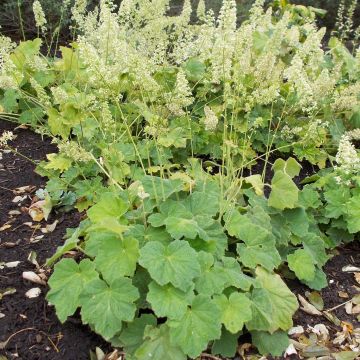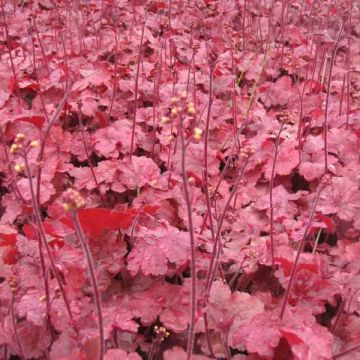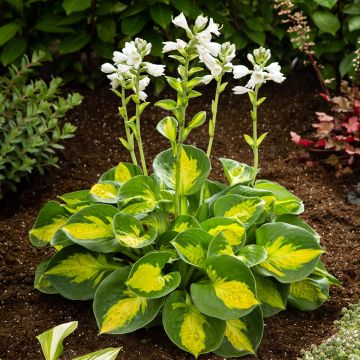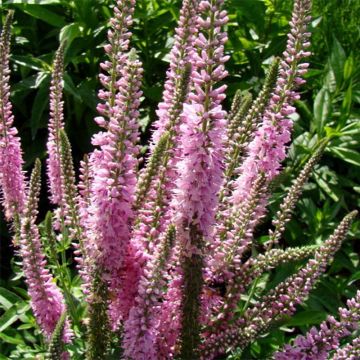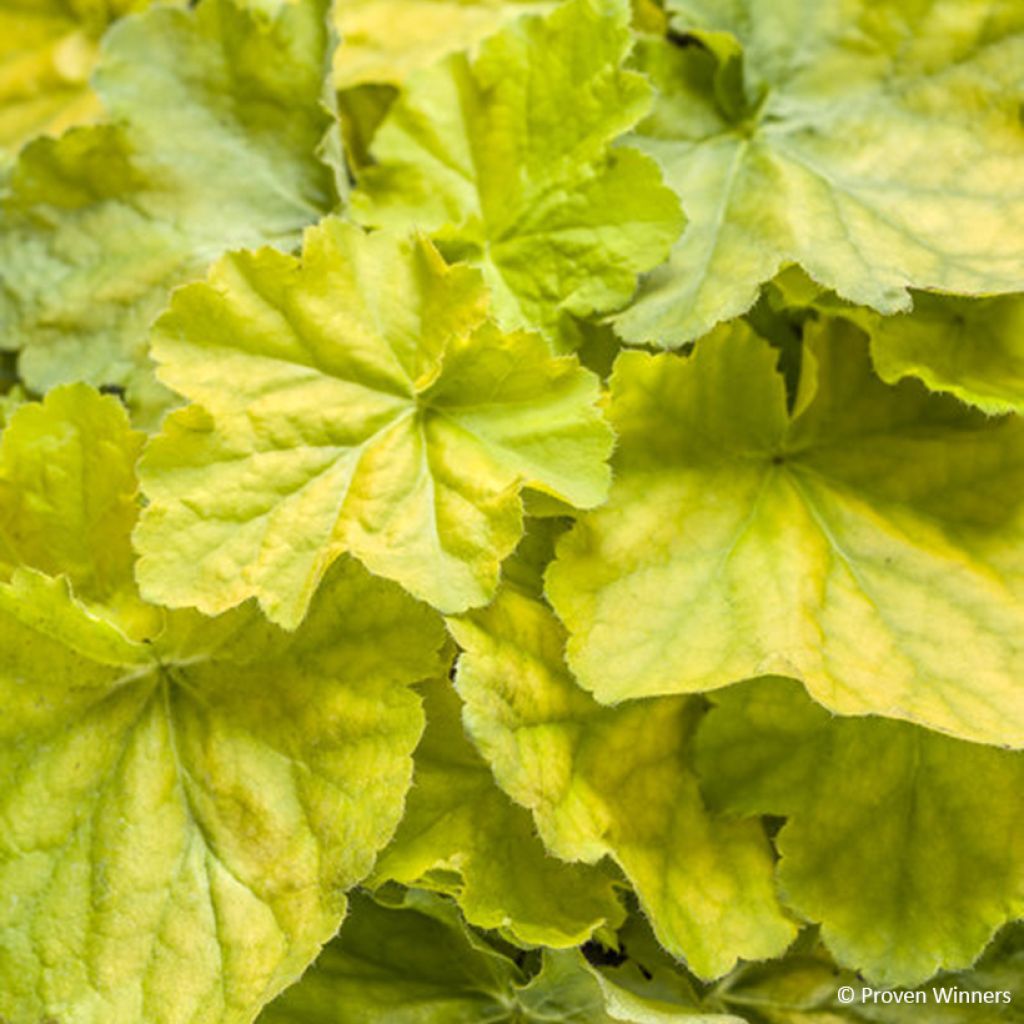

Heuchera Pretty Pistachio
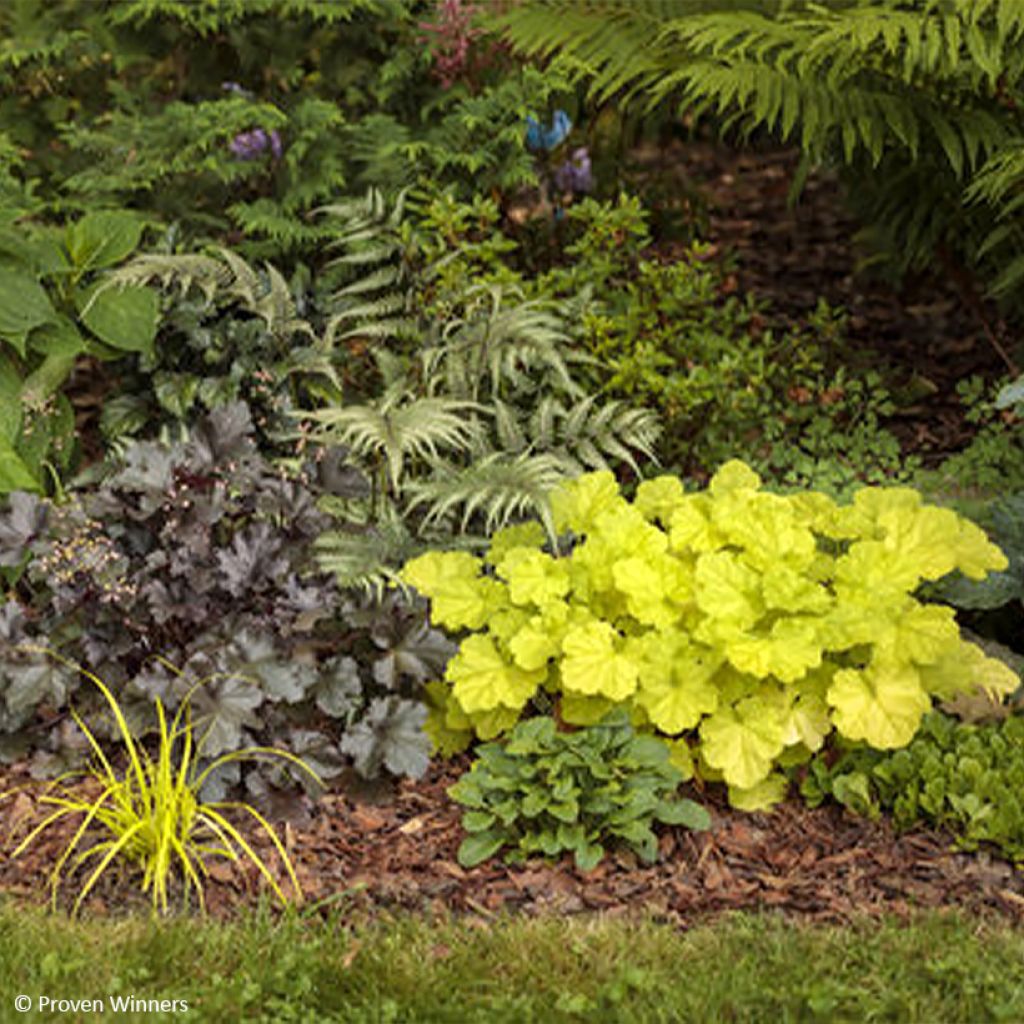

Heuchera Pretty Pistachio
Heuchera Pretty Pistachio
Heuchera 'Pretty Pistachio' PRIMO
Coral Bells, Alumroot
This item cannot be shipped to the selected country
Delivery charge from €5.90
More information
Schedule delivery date,
and select date in basket
This plant carries a 12 months recovery warranty
More information
We guarantee the quality of our plants for a full growing cycle, and will replace at our expense any plant that fails to recover under normal climatic and planting conditions.
From €5.90 for pickup delivery and €6.90 for home delivery
Express home delivery from €8.90.
Does this plant fit my garden?
Set up your Plantfit profile →
Description
The Heuchera 'Pretty Pistachio' Primo is a beautiful perennial ground cover with chartreuse green foliage. It brightens up partially shaded to very shady areas. From mid-summer to autumn, it produces airy pink bell-shaped flower spikes, which then fade to a raspberry hue, enhancing its appeal for several weeks.
Heucheras have become essential plants in our gardens in recent years. Their evergreen foliage, available in multiple shades, adds brilliance to flower beds. These plants from the Saxifragaceae family make fantastic border plants. They also perform very well in containers, making them suitable for even small terraces. 'Pretty Pistachio' Heuchera reaches about 25 cm (10in) in height and 50 cm (20in) in width. The lobed foliage starts off as a beautiful chartreuse or olive green, then turns into a more vibrant lime green, creating a changing spectacle. From July to October, the plant produces tall pyramid-shaped pink flower spikes. These panicles dry out to a lovely raspberry colour, providing the plant with a very long period of interest. This Heuchera belongs to the PRIMO series, which includes varieties with a dense and spreading habit, fast growth, and very long flowering period.
The Heuchera 'Pretty Pistachio', like many Heucheras, is not very demanding when it comes to soil type, as long as it is well-drained. In heavy soil, it is preferable to amend the planting soil with sand or well-decomposed compost. It prefers partial or dappled shade, but still requires some light, at least in the morning, to express its beautiful colours. Full sun, however, would cause leaf burn. Once established, it can tolerate temporary droughts. You can also easily propagate it through cuttings, by taking a section of its creeping stems, allowing you to create an entire border in a few years. This is also a way to rejuvenate the clump, which sometimes tends to decline after 3 to 5 years of cultivation.
Plant this Heuchera in groups to create a spectacular and effective ground cover, or you can also combine it with other varieties with similar colours such as 'Guacamole' or 'Miracle'. On the other hand, you can create contrasts, like with 'Black Pearl' Heuchera for example. In shady areas, it will enhance the dark foliage of ferns like 'Athyrium niponicum Pictum' and will perfectly complement other golden perennials such as 'Leucosceptrum Golden Angel'.
Report an error about the product description
Heuchera Pretty Pistachio in pictures
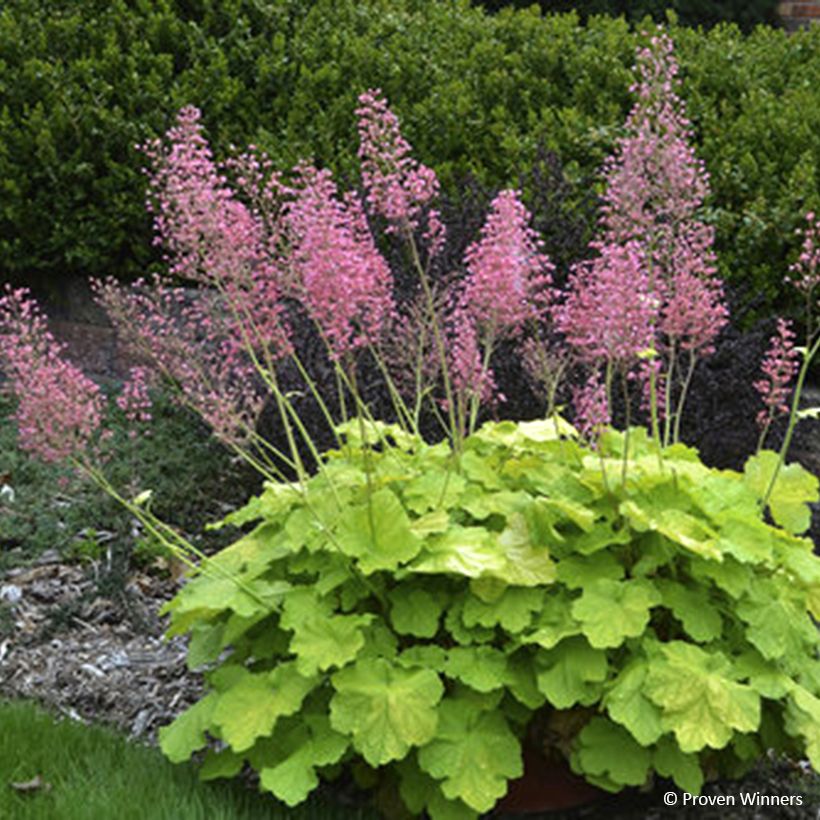

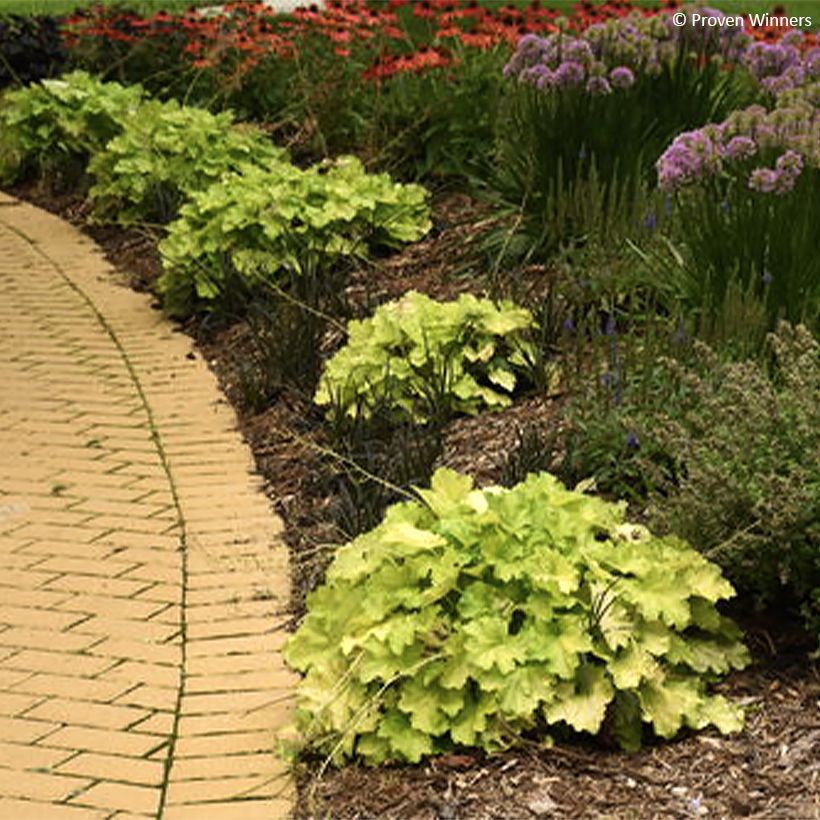

Flowering
Foliage
Plant habit
Botanical data
Heuchera
'Pretty Pistachio' PRIMO
Saxifragaceae
Coral Bells, Alumroot
Cultivar or hybrid
Other Heuchera
Planting and care
Prepare a planting hole of 20 cm (8in) x 20 cm (8in) x 20 cm (8in). If your soil is heavy, mix some compost with the crumbled soil, partially fill the hole and place your seedling (after removing the pot) so that the top of the root ball of your plant is covered with 3 cm (1in) of soil. Adding a base fertiliser (dehydrated blood, horn powder) will nourish your plant during its rooting period without the risk of burning. Firm the soil and water generously to eliminate air pockets. If the weather is dry, you will need to water regularly for a few weeks to facilitate the establishment of your plant. Heucheras renew their foliage in late winter, so we recommend cutting back the previous year's leaves in January or February.
Planting period
Intended location
Care
-
, onOrder confirmed
Reply from on Promesse de fleurs
Summer flowering perennials
Haven't found what you were looking for?
Hardiness is the lowest winter temperature a plant can endure without suffering serious damage or even dying. However, hardiness is affected by location (a sheltered area, such as a patio), protection (winter cover) and soil type (hardiness is improved by well-drained soil).

Photo Sharing Terms & Conditions
In order to encourage gardeners to interact and share their experiences, Promesse de fleurs offers various media enabling content to be uploaded onto its Site - in particular via the ‘Photo sharing’ module.
The User agrees to refrain from:
- Posting any content that is illegal, prejudicial, insulting, racist, inciteful to hatred, revisionist, contrary to public decency, that infringes on privacy or on the privacy rights of third parties, in particular the publicity rights of persons and goods, intellectual property rights, or the right to privacy.
- Submitting content on behalf of a third party;
- Impersonate the identity of a third party and/or publish any personal information about a third party;
In general, the User undertakes to refrain from any unethical behaviour.
All Content (in particular text, comments, files, images, photos, videos, creative works, etc.), which may be subject to property or intellectual property rights, image or other private rights, shall remain the property of the User, subject to the limited rights granted by the terms of the licence granted by Promesse de fleurs as stated below. Users are at liberty to publish or not to publish such Content on the Site, notably via the ‘Photo Sharing’ facility, and accept that this Content shall be made public and freely accessible, notably on the Internet.
Users further acknowledge, undertake to have ,and guarantee that they hold all necessary rights and permissions to publish such material on the Site, in particular with regard to the legislation in force pertaining to any privacy, property, intellectual property, image, or contractual rights, or rights of any other nature. By publishing such Content on the Site, Users acknowledge accepting full liability as publishers of the Content within the meaning of the law, and grant Promesse de fleurs, free of charge, an inclusive, worldwide licence for the said Content for the entire duration of its publication, including all reproduction, representation, up/downloading, displaying, performing, transmission, and storage rights.
Users also grant permission for their name to be linked to the Content and accept that this link may not always be made available.
By engaging in posting material, Users consent to their Content becoming automatically accessible on the Internet, in particular on other sites and/or blogs and/or web pages of the Promesse de fleurs site, including in particular social pages and the Promesse de fleurs catalogue.
Users may secure the removal of entrusted content free of charge by issuing a simple request via our contact form.
The flowering period indicated on our website applies to countries and regions located in USDA zone 8 (France, the United Kingdom, Ireland, the Netherlands, etc.)
It will vary according to where you live:
- In zones 9 to 10 (Italy, Spain, Greece, etc.), flowering will occur about 2 to 4 weeks earlier.
- In zones 6 to 7 (Germany, Poland, Slovenia, and lower mountainous regions), flowering will be delayed by 2 to 3 weeks.
- In zone 5 (Central Europe, Scandinavia), blooming will be delayed by 3 to 5 weeks.
In temperate climates, pruning of spring-flowering shrubs (forsythia, spireas, etc.) should be done just after flowering.
Pruning of summer-flowering shrubs (Indian Lilac, Perovskia, etc.) can be done in winter or spring.
In cold regions as well as with frost-sensitive plants, avoid pruning too early when severe frosts may still occur.
The planting period indicated on our website applies to countries and regions located in USDA zone 8 (France, United Kingdom, Ireland, Netherlands).
It will vary according to where you live:
- In Mediterranean zones (Marseille, Madrid, Milan, etc.), autumn and winter are the best planting periods.
- In continental zones (Strasbourg, Munich, Vienna, etc.), delay planting by 2 to 3 weeks in spring and bring it forward by 2 to 4 weeks in autumn.
- In mountainous regions (the Alps, Pyrenees, Carpathians, etc.), it is best to plant in late spring (May-June) or late summer (August-September).
The harvesting period indicated on our website applies to countries and regions in USDA zone 8 (France, England, Ireland, the Netherlands).
In colder areas (Scandinavia, Poland, Austria...) fruit and vegetable harvests are likely to be delayed by 3-4 weeks.
In warmer areas (Italy, Spain, Greece, etc.), harvesting will probably take place earlier, depending on weather conditions.
The sowing periods indicated on our website apply to countries and regions within USDA Zone 8 (France, UK, Ireland, Netherlands).
In colder areas (Scandinavia, Poland, Austria...), delay any outdoor sowing by 3-4 weeks, or sow under glass.
In warmer climes (Italy, Spain, Greece, etc.), bring outdoor sowing forward by a few weeks.

































